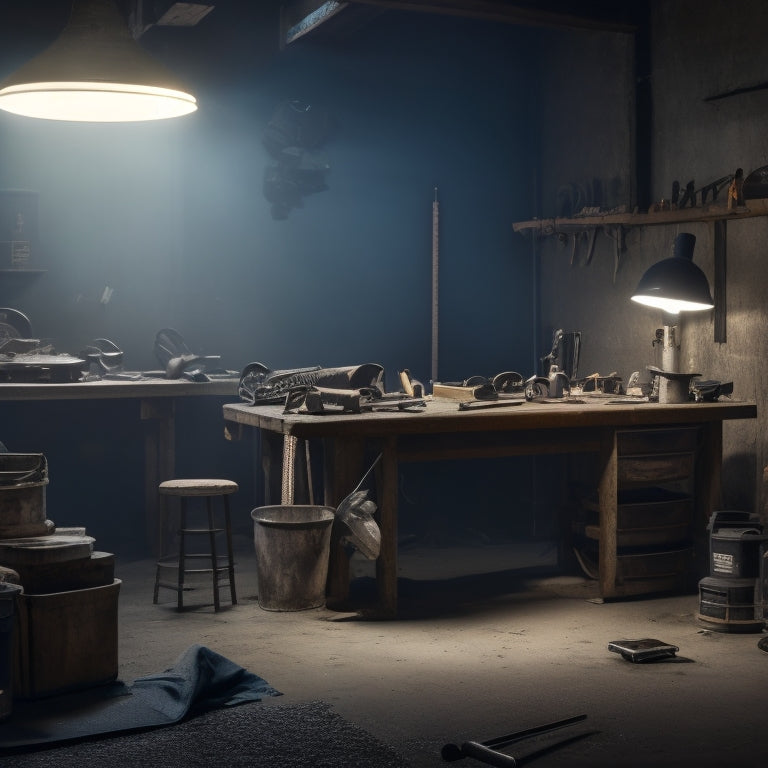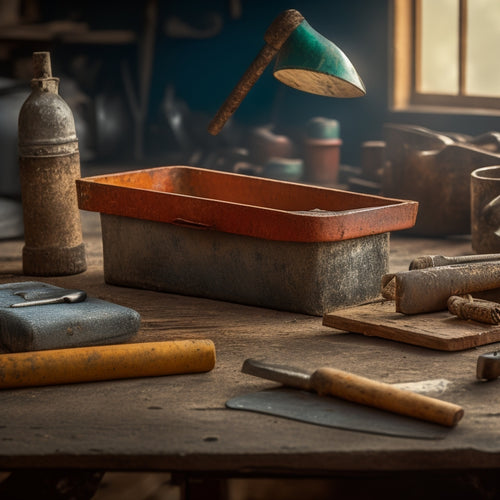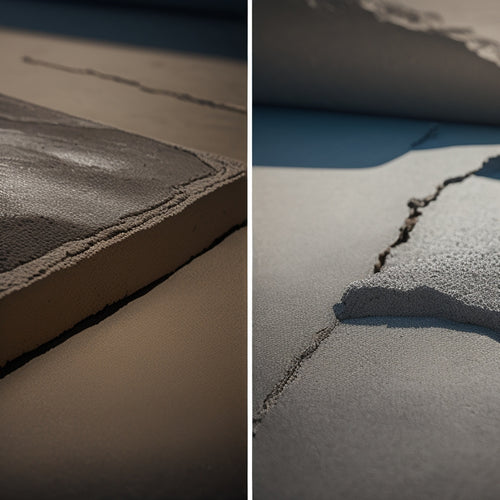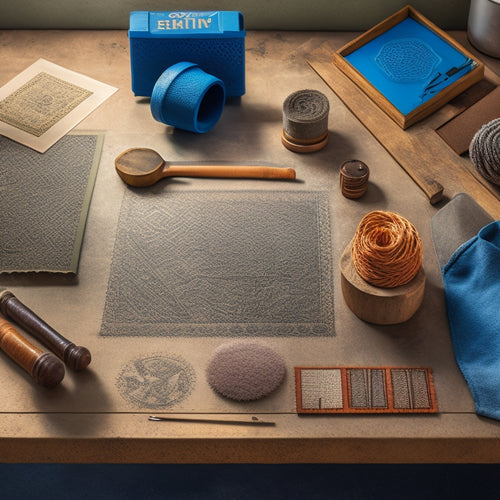
Top Tools for Expert-Level Concrete Finishes
Share
You require a portfolio of specialized tools and advanced techniques to achieve expert-level concrete finishes, starting with high-quality trowels and floats that can handle everything from screeding to texturing and polishing. Invest in ergonomic, durable tools with sustainable materials to minimize fatigue and waste. Advanced edging and jointing techniques, along with precision measuring and testing tools, will take your finishes to the next level. Don't forget to add power tools like high-torque drill motors and advanced grinders to your arsenal for increased efficiency and precision. Now that you've got the essentials, it's time to refine your skills and explore the nuances of expert-level concrete finishing.
Key Takeaways
• Invest in high-quality trowels, floats, and edgers with ergonomic handles to minimize fatigue and ensure professional-grade results.
• Utilize specialized finishing accessories like edgers, jointers, and texture mats to enhance finishing techniques and quality.
• Select high-torque drill motors and advanced grinder technology to improve efficiency, accuracy, and safety in concrete finishing tasks.
• Employ precision measuring and testing tools, such as digital calipers and temperature probes, to ensure accurate data and quality assurance.
• Choose sustainable materials and maintain tools regularly to reduce waste, increase longevity, and achieve expert-level concrete finishes.
Essential Trowels and Floats
You'll rely on trowels and floats to achieve a smooth, even surface, as these essential tools allow you to screed, float, and finish concrete with precision and control.
When it comes to trowel types, you'll want to have a range of options at your disposal. A v-notched trowel is ideal for applying a bonding agent or finishing a textured surface, while a flat trowel is better suited for smoothing out freshly poured concrete. For more intricate work, a pointing trowel or a margin trowel may be necessary.
Floats, on the other hand, come in a variety of materials, each with its own strengths and weaknesses. A magnesium float is lightweight and easy to maneuver, making it perfect for large, open areas. A resin float, with its durable and abrasion-resistant surface, is better suited for high-traffic areas or surfaces that require a high-gloss finish.
Advanced Edging and Jointing
Get ready to add definition and crispness to your concrete finishes by mastering advanced edging and jointing techniques, which demand precision and a keen eye for detail.
As you refine your skills, you'll be able to create visually appealing joints and edges that elevate your concrete work. To achieve this, focus on developing creative edging techniques that complement your project's design. For instance, you can use a combination of rounded and sharp edges to add texture and visual interest.
When it comes to joint placement strategies, consider the structural integrity of your concrete slab. Properly placed joints can help reduce cracking and guarantee a more durable finish. You'll want to strategically position joints to accommodate natural stress points and movement in the concrete. By doing so, you'll create a stronger, more resilient finish that withstands the test of time.
Remember to always prioritize safety when working with concrete, wearing protective gear and following established best practices to avoid accidents. By mastering advanced edging and jointing techniques, you'll release a new level of sophistication in your concrete finishes.
High-Quality Finishing Tools
Mastering advanced edging and jointing techniques demands a range of high-quality finishing tools, which are designed to deliver precision and control as you refine your concrete finishes. You'll need a variety of tools to achieve the desired results, including trowels, floats, and edgers.
When selecting your finishing tools, look for ones made from sustainable materials that can withstand the demands of your project. This won't only reduce waste but also guarantee your tools last longer.
For decorative overlays, you'll require specialized tools that can achieve intricate patterns and designs. Invest in a high-quality stamping mat or texture skins to create unique, one-of-a-kind finishes.
Additionally, consider using tools with ergonomic handles to reduce fatigue and improve grip, guaranteeing you maintain control and precision throughout the finishing process.
Don't compromise on quality – invest in the best tools for the job to achieve professional-grade results. Remember, high-quality finishing tools are an investment in your craft, and they'll pay dividends in the long run.
With the right tools, you'll be able to deliver exceptional concrete finishes that exceed your clients' expectations.
Texturing and Stamping Options
When you're looking to add unique textures and patterns to your concrete finishes, you'll want to contemplate the various options available to you.
You'll need to think about the specific patterns and design elements you want to achieve, as well as the material texture options that will help you get there.
Patterns and Design Elements
You can achieve a wide range of patterns and design elements in your concrete finishes by utilizing various texturing and stamping options, which allow for an impressive degree of customization and creativity. With the right tools and techniques, you can create unique and visually appealing stamped patterns, decorative elements, and color variations that enhance the aesthetic appeal of your concrete surfaces.
Here are some popular texturing and stamping options to explore:
| Pattern/Design Element | Description | Application |
|---|---|---|
| Geometric Designs | Create intricate patterns using shapes and lines | Overlay applications, finishing styles |
| Artistic Techniques | Use hand-carved or stenciled designs for a personalized touch | Decorative elements, color variations |
| Stamped Patterns | Mimic natural materials like stone, wood, or brick | Surface finishes, overlay applications |
| Textured Finishes | Add depth and dimension with varied textures | Finishing styles, decorative elements |
| Custom Designs | Create one-of-a-kind designs using specialized tools and techniques | Artistic techniques, stamped patterns |
Material Texture Options
Get ready to take your concrete finishes to the next level by exploring the vast array of material texture options, which can convincingly mimic the look and feel of natural materials or create unique, one-of-a-kind surfaces.
You'll find that these options can greatly enhance the aesthetic appeal of your concrete projects. From subtle, understated textures to bold, dramatic statements, the right material texture can elevate your work from ordinary to extraordinary.
When it comes to surface treatment methods, you'll have a range of choices to achieve the desired texture. For instance, you can use stamping tools to create realistic patterns that mimic natural stone, wood, or other materials.
Alternatively, you can employ aesthetic enhancement techniques like acid etching, staining, or polishing to add depth and visual interest to your concrete surfaces.
Whether you're aiming for a rustic, distressed look or a sleek, modern finish, the right material texture options will help you achieve your vision. By experimenting with different techniques and materials, you'll reveal new possibilities for creative expression and take your concrete finishes to new heights.
Tooling and Techniques
Stamping tools and texturing mats are essential components in your concrete finishing arsenal, allowing you to imprint patterns and designs onto freshly poured concrete or overlay systems. These tools enable you to create unique, high-end finishes that elevate your project's aesthetic appeal. When selecting tooling and techniques, prioritize safety practices to avoid accidents and guarantee a successful project.
To achieve expert-level finishes, consider the following:
-
Pattern selection: Choose stamping tools or texturing mats that align with your project's design requirements. From rustic stone to modern geometric patterns, the right tool can make or break your finish.
-
Mat size and flexibility: Select texturing mats that can accommodate your project's scale and complexity. Flexible mats can conform to irregular surfaces, while larger mats can cover more area with fewer passes.
-
Stamping pressure and timing: Optimize your stamping technique by applying the right amount of pressure and timing. This guarantees a consistent, high-quality pattern that meets your project's standards.
Power Tools for Speed
When you're working on a concrete finish, you need power tools that can keep up with your pace.
That's where high-torque drill motors and advanced grinder technology come in - they're designed to help you work efficiently and effectively.
High-Torque Drill Motors
To achieve fast and efficient drilling through concrete, you'll need a high-torque drill motor that can deliver the necessary power to drive large-diameter bits and mixing paddles.
When it comes to drill motor technology, torque specifications are vital in determining the motor's ability to handle demanding tasks.
Here are three key benefits of high-torque drill motors that make them essential for expert-level concrete finishes:
-
Increased productivity: With high-torque drill motors, you can drill faster and more efficiently, reducing the time spent on each task and increasing your overall productivity.
-
Improved accuracy: High-torque drill motors provide the necessary power to drive large-diameter bits, ensuring accurate and consistent results, even in the toughest concrete applications.
-
Enhanced safety: By providing the necessary power to complete tasks quickly and efficiently, high-torque drill motors reduce the risk of fatigue and accidents, ensuring a safer working environment.
When selecting a high-torque drill motor, look for models with high torque specifications, durable construction, and advanced features such as variable speed control and overload protection.
With the right drill motor, you'll be able to achieve expert-level concrete finishes with ease and confidence.
Advanced Grinder Technology
Your concrete finishing projects demand speed and efficiency, which is where advanced grinder technology comes in, empowering you to tackle demanding tasks with precision and control.
With advanced grinders, you can master various grinding techniques to achieve expert-level finishes. These powerful tools are designed to handle heavy-duty applications, making quick work of even the toughest concrete surfaces.
When it comes to diamond blades, advanced grinders take the cake. Equipped with high-performance blades, these grinders can slice through concrete like butter, leaving a smooth, even finish. The result is a surface that's not only aesthetically pleasing but also safer to walk on.
Advanced grinders also feature improved ergonomics, reducing fatigue and allowing you to work for extended periods without discomfort.
To get the most out of your advanced grinder, make certain to follow proper safety protocols. Wear protective gear, including gloves, safety glasses, and a dust mask.
Additionally, verify the grinder is properly maintained, with regular cleaning and blade replacements as needed. By combining advanced grinder technology with proper technique and safety precautions, you'll be able to achieve flawless concrete finishes in no time.
Specialized Finishing Accessories
You'll find that specialized finishing accessories, such as edgers, jointers, and texture mats, play a vital role in achieving high-quality, professional-looking concrete finishes. These accessories help you refine your finishing techniques and take your work to the next level.
To get the most out of your specialized finishing accessories, it's important to prioritize accessory maintenance. Here are three significant tips to keep in mind:
-
Regularly clean and inspect your accessories: This will help prevent damage and guarantee peak performance.
-
Store your accessories properly: Keep them organized and protected from the elements to extend their lifespan.
-
Follow manufacturer guidelines: Adhere to the recommended maintenance schedule and usage instructions to avoid accidents and secure safety.
Precision Measuring and Testing
As you refine your finishing techniques with specialized accessories, accurately measuring and testing concrete properties becomes critical to achieving a flawless finish, and that's where precision measuring and testing tools come into play.
You'll need to guarantee that your concrete meets the required measurement standards, whether it's for a residential, commercial, or industrial project. To do this, you'll need to employ various testing methods, such as slump tests, air content tests, and compressive strength tests.
Invest in high-quality precision measuring tools like digital calipers, precision scales, and temperature probes to gather accurate data. These tools will help you monitor and control factors like temperature, humidity, and air content, which can greatly impact your concrete's final finish.
Additionally, consider investing in advanced testing equipment like portable concrete scanners or non-destructive testing devices to analyze your concrete's internal structure and integrity.
Frequently Asked Questions
How Do I Prevent Concrete From Drying Out Too Quickly?
When you're working with concrete, you'll want to prevent it from drying out too quickly to guarantee a strong, durable finish.
To do this, focus on moisture retention and employ effective curing techniques.
Apply a curing compound to the surface, and use a misting system or evaporation retarders to slow down moisture loss.
You'll also want to maintain a consistent temperature and humidity level to prevent rapid drying.
What Safety Gear Is Essential for Concrete Finishing Work?
You're about to plunge into the messy world of concrete finishing, where one wrong move can leave you covered in a cement catastrophe!
But don't worry, safety comes first!
You'll need to gear up with the essentials: a dust mask to avoid inhaling silica particles, safety glasses to protect those peepers, and gloves to prevent skin irritation.
Remember, following safety regulations is key, so invest in personal protective equipment (PPE) that meets industry standards.
Stay safe, finish strong!
Can I Use Regular Cleaning Products on My Tools?
When it comes to cleaning your tools, you shouldn't reach for regular cleaning products.
Harsh chemicals can damage coatings, corrode metal, or leave residues that affect future concrete finishes.
Instead, opt for mild cleaning solutions specifically designed for tool maintenance.
These gentle yet effective products will keep your tools in top condition without compromising their performance or your safety.
Always read labels and follow instructions to guarantee you're using the right cleaner for the job.
How Do I Achieve a Consistent Color With Integral Color Concrete?
Did you know that 75% of concrete color inconsistencies occur due to improper pigment selection? To achieve a consistent color with integral color concrete, you'll need to master color mixing.
First, choose a high-quality pigment that's specifically designed for concrete. Then, follow the manufacturer's instructions for mixing ratios and procedures. It's essential to maintain a consistent mixing process to guarantee uniform color distribution.
Always wear protective gear, including gloves and goggles, when handling pigments to avoid skin and eye irritation.
What Is the Ideal Temperature for Finishing Concrete Outdoors?
When you're finishing concrete outdoors, you'll want to pay close attention to the temperature.
Aim for a range between 50°F and 70°F (10°C and 21°C) for ideal results.
Extreme temperatures can cause issues like rapid setting, delayed hydration, or even cracking.
Be aware of how temperature affects concrete: high temps accelerate setting, while low temps slow it down.
Conclusion
You've got the skills, now it's time to upgrade your toolkit.
Imagine a perfectly poured slab, every detail precise, every finish flawless. Can you envision the satisfaction of achieving that level of mastery?
With these top tools for expert-level concrete finishes, you'll be well on your way to making that vision a reality.
From essential trowels to specialized finishing accessories, you'll be equipped to tackle even the most demanding projects with confidence and precision.
Related Posts
-

Smart Guide to Buying Used Concrete Hand Tools
You're about to buy used concrete hand tools, and you need to get it right. Dedicate time to identify the tools you n...
-

What Tools Ensure Strong Concrete Adhesion at Home
You'll need the right tools to guarantee strong concrete adhesion at home. For surface preparation, use concrete surf...
-

5 Best Tools for Stamping Concrete Walls
When it comes to stamping concrete walls, you'll need a range of specialized tools to achieve the desired texture and...


